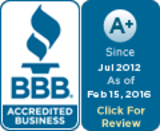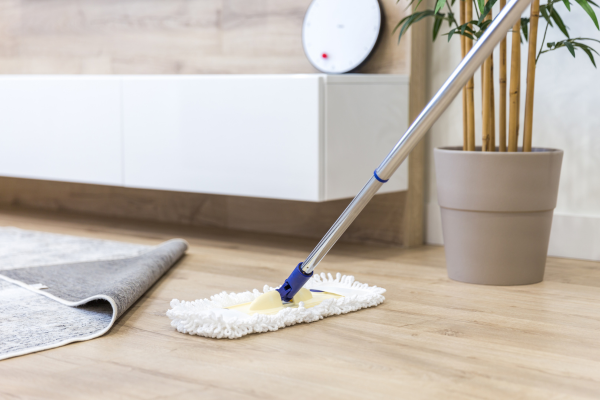Uh oh! You’ve spilled something on the floor. Accidents happen — and when they do, our reflex is to grab a paper towel to quickly clean up the mess. But what about the potential stickiness, the bacteria, or the mess we track around the house in the process? Disinfectants have become the go-to solution for ridding household surfaces and floors of germs and spills. While scrubbing away the last evidence of a spill may leave us with satisfaction, it may also come with a cost. To avoid additional costs or damage down the road, it’s important to be cautious of harmful ingredients and chemicals to avoid when cleaning your floors.
Cleaning Floors Without Consequences: Chemicals to Avoid for a Damage-Free Finish
While certain ingredients may kill germs and scrub away dirt and grime, they can also eat away at your floors and the finish. Here are the chemicals to avoid when cleaning certain types of floors.
Hardwood
Hardwood floors are a timeless and elegant addition to any home, providing warmth and beauty. To keep them looking their best, regular cleaning is essential. However, when it comes to cleaning hardwood floors, it’s crucial to be mindful of the chemicals and ingredients present in cleaning products. Harsh chemicals can cause irreversible damage, stripping away the floor’s natural beauty and compromising its integrity.
Ammonia
Ammonia-based cleaners should be avoided when cleaning hardwood floors. Ammonia is a strong alkaline compound that can dull the finish, strip away natural oils, and cause discoloration. It can also weaken the wood fibers, leading to permanent damage over time. Opt for ammonia-free alternatives to preserve the beauty and longevity of your hardwood floors.
Bleach
Bleach is a powerful disinfectant and stain remover, but it is too harsh for hardwood floors. It can strip away the protective finish, cause discoloration, and weaken the wood fibers. Additionally, bleach fumes can be harmful when inhaled. Instead, look for mild, pH-neutral cleaners specifically formulated for hardwood floors.
Oil Soaps and Waxes
While oil soaps and wax-based products may provide temporary shine, they can leave behind residue that builds up over time, attracting dirt and making the floor appear dull. Additionally, excessive use of oil-based products can prevent the proper adhesion of future finishes or make refinishing more challenging. Stick to recommended hardwood floor cleaners that are specifically formulated for regular maintenance.
High-Alcohol Cleaners
Avoid using high-alcohol content cleaners on hardwood floors. Alcohol can dry out the wood and damage the protective finish. It is best to choose mild, water-based cleaners that are safe for hardwood surfaces.
Vinegar
While vinegar is often touted as a natural cleaning agent, it is acidic and can damage hardwood floors. The acetic acid in vinegar can wear away the protective finish, leading to dullness and potential discoloration. Instead, choose cleaners specifically designed for hardwood floors or consider homemade solutions using gentle ingredients like water and mild dish soap.
Stained Concrete
Stained concrete floors have become a popular choice for their unique and customizable aesthetics. Much like hardwood floors, proper cleaning and maintenance are essential to preserve its beauty and longevity. In addition to the chemicals mentioned above, abrasive tools, oil-based cleaners, and harsh solvents should be added to the list of chemicals to avoid.
Abrasive Tools
Avoid using abrasive tools, such as scouring pads, on stained concrete floors. These can scratch or damage the stain and concrete surface, diminishing their appearance and finish. Opt for soft microfiber mops or brushes with gentle bristles for cleaning.
Harsh Solvents
Harsh solvents, like acetone or mineral spirits, should be avoided when cleaning stained concrete floors. These solvents can dissolve or strip away the stain, leaving behind a patchy or uneven appearance. Use solvent-free or mild cleaning products specifically designed for stained concrete surfaces.
Oil-Based Cleaners
Oil-based cleaners or products can leave behind a residue on stained concrete floors, making them appear dull or slippery. Avoid using oil-based cleaners and choose water-based or neutral pH cleaners for effective and safe cleaning.
Cleaning stained concrete and hardwood floors requires a delicate approach to protect their beauty and integrity. By avoiding these harmful ingredients, you can ensure that your floors retain the vibrant color, texture, and visual appeal of your space for years to come.
When in doubt, call the pros to clean and maintain your floors. Look no further than the Pink Shoe Cleaning Crew, a trusted team dedicated to providing top-notch cleaning services. With their expertise, you can have peace of mind knowing that your floors will be treated with care and cleaned using safe and effective methods.
From avoiding harmful chemicals to utilizing eco-friendly products, the team at Pink Shoe Cleaning Crew prioritizes the health of your family and the environment. Reach out to the Pink Shoe Cleaning Crew today and let their skilled professionals transform your home into a spotless and welcoming sanctuary. Sit back, relax, and enjoy a clean and fresh living space without the hassle of doing it yourself. Trust Pink Shoe Cleaning Crew to deliver exceptional cleaning results that exceed your expectations.












